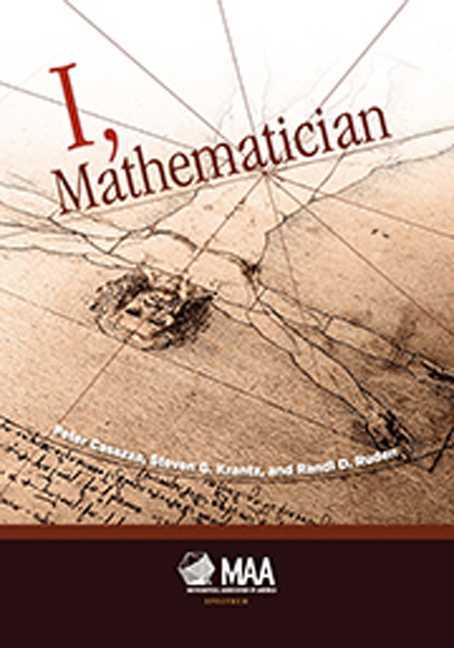Book contents
- Frontmatter
- Contents
- Preface
- Part 1 Who Are Mathematicians?
- Foreword to Who Are Mathematicians?
- 1 Mathematicians and Mathematics
- 2 What Are Mathematicians Really Like? Observations of a Spouse
- 3 Mathematics: Art and Science
- 4 A Mathematician's Survival Guide
- 5 We Are Different
- 6 The Naked Lecturer
- 7 Through a Glass Darkly
- 8 What's a Nice Guy Like Me Doing in a Place Like This?
- 9 A Mathematician's Eye View
- 10 I am a Mathematician
- Part II On Becoming a Mathematician
- Part III Why I Became a Mathematician
4 - A Mathematician's Survival Guide
from Part 1 - Who Are Mathematicians?
- Frontmatter
- Contents
- Preface
- Part 1 Who Are Mathematicians?
- Foreword to Who Are Mathematicians?
- 1 Mathematicians and Mathematics
- 2 What Are Mathematicians Really Like? Observations of a Spouse
- 3 Mathematics: Art and Science
- 4 A Mathematician's Survival Guide
- 5 We Are Different
- 6 The Naked Lecturer
- 7 Through a Glass Darkly
- 8 What's a Nice Guy Like Me Doing in a Place Like This?
- 9 A Mathematician's Eye View
- 10 I am a Mathematician
- Part II On Becoming a Mathematician
- Part III Why I Became a Mathematician
Summary
An Algebra Teacher I could Understand
Emmy award-winning journalist and bestselling author Cokie Roberts once said:
As long as algebra is taught in school, there will be prayer in school.
An Object of Pride
A mathematician's relationship with the general public most closely resembles bipolar disorder—at the same time they admire us and hate us. Almost everyone has had at least one bad experience with mathematics during some part of their education. Get into any taxi and tell the driver you are a mathematician and the response is predictable. First, there is silence while the driver relives his greatest nightmare—taking algebra. Next, you will hear the immortal words: “I was never any good at mathematics.” My response is: “I was never any good at being a taxi driver so I went into mathematics.” You can learn a lot from taxi drivers if you just don't tell them you are a mathematician. Why get started on the wrong foot?
The mathematician David Mumford put it this way:
I am accustomed, as a professional mathematician, to living in a sort of vacuum, surrounded by people who declare with an odd sort of pride that they are mathematically illiterate
A Balancing Act
The other most common response we get from the public is: “I can't even balance my checkbook.” This reflects the fact that the public thinks that mathematics is basically just adding numbers. They have no idea what we really do. Because of the textbooks they studied, they think that all needed mathematics has already been discovered. They think “research” in mathematics is library research. They have no idea that mathematicians can't balance their checkbooks either—although for reasons different from theirs.
Accounting to the Public
The public sees us as slightly mad geniuses since we take for granted things they cannot even imagine. They see us as aliens who are just visiting this planet long enough to make their lives miserable. They are not sure if they should be talking to us or running for the exit. They are pleasantly surprised if they discover we can hold a normal conversation with a mere mortal. We like appearing as “geniuses” to the public. If we must have a false mystique, this is probably the best we could ever hope for. The problem is that their definition of “genius” is quite different from ours.
- Type
- Chapter
- Information
- I, Mathematician , pp. 31 - 47Publisher: Mathematical Association of AmericaPrint publication year: 2015

